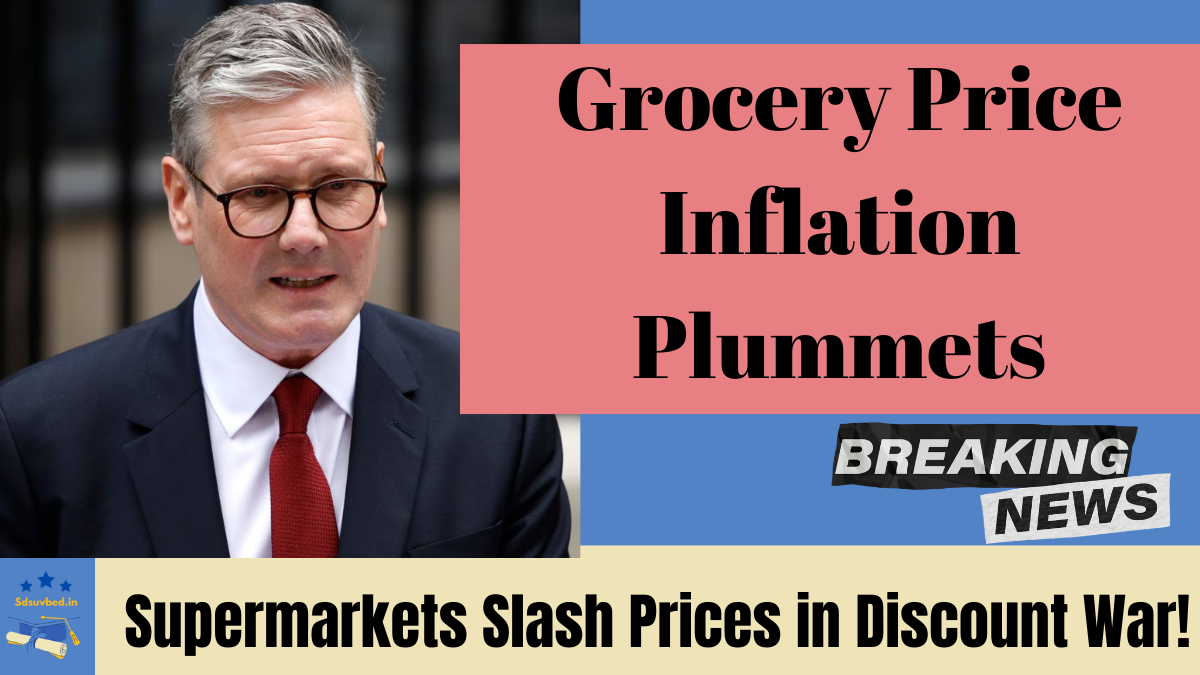Grocery price inflation in the UK slowed to 3.3% in January 2025, down from 3.7% in December, as supermarkets offered more discounts to attract price-conscious shoppers. According to research group Kantar, the increased focus on promotional sales helped relieve some of the pressure on consumers after months of rising food prices.
Promotional spending rose by £274 million year-on-year, making up 27.2% of total supermarket sales—the highest level seen in January since 2021. Meanwhile, non-branded products reached a record 52.3% of sales, showing a shift toward budget-friendly choices.

Which Supermarkets Are Gaining or Losing Market Share?
While overall supermarket sales increased by 4.3% in January, some retailers performed better than others:
- Tesco continued to dominate the UK market, growing sales by 5.6% and increasing its market share from 27.8% to 28.5%.
- Sainsbury’s followed closely with a 4.2% rise in sales, expanding its share from 15.7% to 15.9%.
- Lidl led the discount retailers with a 7.4% increase in sales, reaching £2.6 billion.
- Aldi also performed well, growing sales by 4.2% and expanding its market share to 10.2%.
- Ocado continued its strong growth, achieving an 11.3% sales increase, marking its ninth consecutive month as the fastest-growing UK supermarket.
Meanwhile, Asda struggled to keep up, seeing a 5.2% drop in sales over the 12 weeks leading up to January 28, reducing its market share from 13.6% to 12.6%.
How is Consumer Shopping Behavior Changing?
Several trends shaped shopping habits in January 2025:
- More Shoppers Choosing Non-Branded Products – Own-label goods saw a 5.4% sales increase, reaching an all-time high of 52.3% of supermarket purchases.
- Health-Conscious Choices – Sales of fresh fruit, vegetables, and salad totaled £1.2 billion, as consumers focused on healthier eating.
- Rise of Alcohol Alternatives – Sales of low and no-alcohol drinks grew 7% year-on-year, with 6.7% of households purchasing at least one alcohol-free option.
Despite these trends, 49% of UK shoppers still bought alcohol in January, down from 76% in December, reflecting seasonal shifts in purchasing habits.
Which Supermarkets are Benefiting from Discounting Strategies?
| Supermarket | Sales Growth (%) | Market Share Change (%) |
|---|---|---|
| Tesco | +5.6% | 27.8% → 28.5% |
| Sainsbury’s | +4.2% | 15.7% → 15.9% |
| Lidl | +7.4% | Higher sales at £2.6B |
| Aldi | +4.2% | Increased to 10.2% |
| Ocado | +11.3% | Now at 1.9% |
| Asda | -5.2% | 13.6% → 12.6% |
FAQs
Why is grocery price inflation slowing down?
Supermarkets have increased discounting and promotions, driving inflation down from 3.7% to 3.3% in January 2025.
Which UK supermarket had the biggest growth?
Ocado had the highest growth at 11.3%, followed by Lidl at 7.4%.
Why is Asda losing market share?
Asda’s sales dropped by 5.2%, reducing its market share to 12.6%, due to increased competition and consumer preference for discount retailers.
Are shoppers choosing more non-branded products?
Yes, non-branded goods reached a record 52.3% of total supermarket sales, showing a shift toward budget-conscious spending.
How much did UK supermarkets make from promotions?
Promotions accounted for £274 million more in sales year-on-year, making up 27.2% of total sales.
Is health-conscious shopping increasing?
Yes, sales of fresh fruits, vegetables, and salads totaled £1.2 billion, as consumers focused on healthier choices.
How popular are low and no-alcohol drinks?
Sales of alcohol alternatives grew 7% year-on-year, with 6.7% of households buying at least one.
What is the outlook for UK grocery prices?
Grocery inflation is expected to continue slowing as supermarkets increase promotions and compete for shoppers.
Conclusion
UK supermarkets are competing aggressively through discounting strategies, helping drive grocery price inflation down to 3.3%. While Tesco, Lidl, and Ocado continue to gain market share, Asda is struggling to keep pace.
With budget-conscious shoppers opting for discounts and non-branded products, supermarkets are shifting their focus to promotions to attract more customers. As inflation slows, consumers are expected to benefit from continued price reductions in the coming months.
A passionate content writer specializing in creating engaging, SEO-optimized content. With expertise in blogs, web copy, and storytelling, I craft words that connect with audiences and deliver results.
